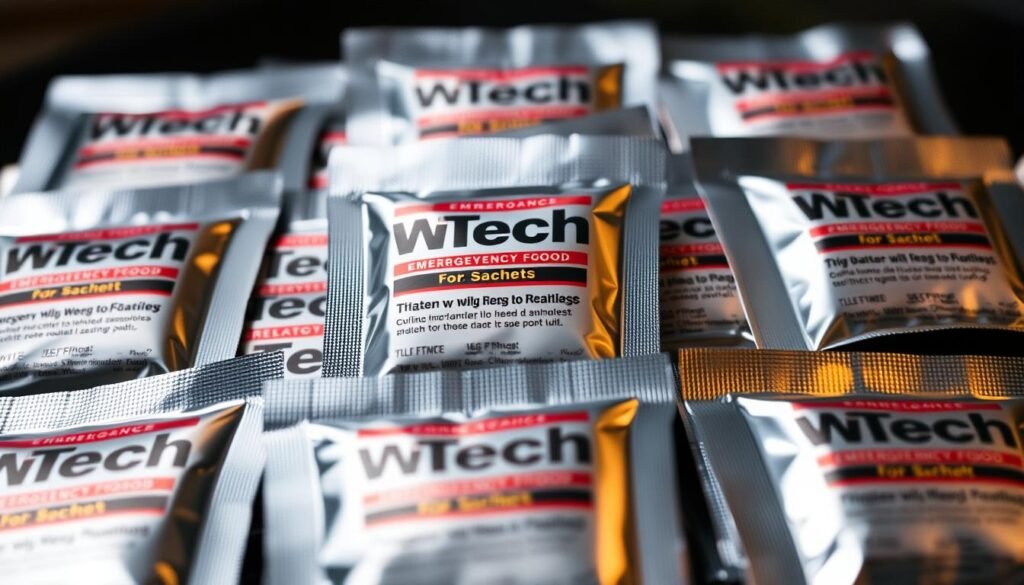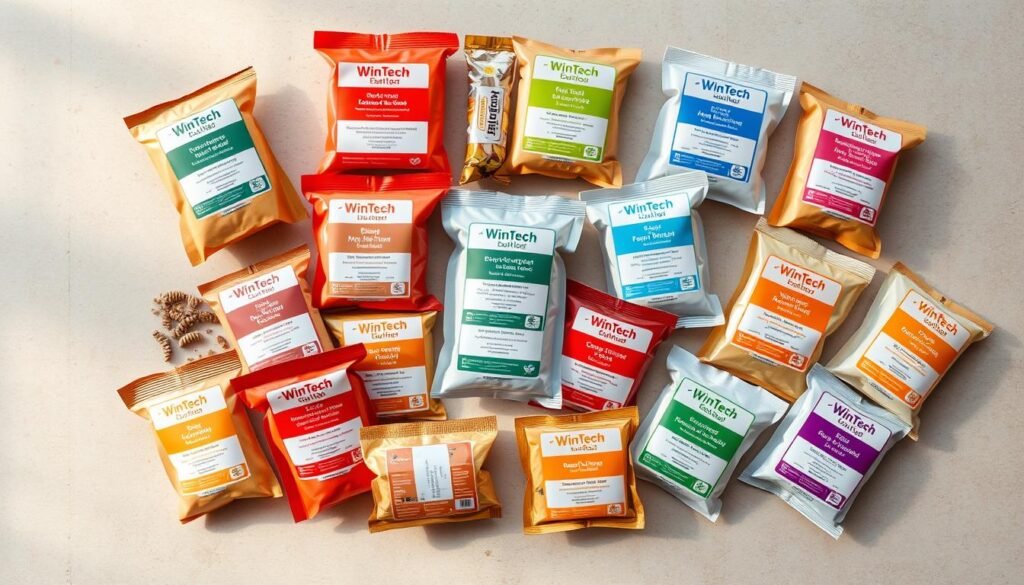Have you ever wondered how critical food storage solutions can mean the difference between survival and struggle during a disaster? What are sachets and why are they becoming a game-changer in emergency preparedness?
In the unpredictable landscape of food security, what are sachets emerge as a revolutionary solution for long-term storage. These compact, versatile packaging options provide a critical lifeline during emergencies, ensuring communities can access preserved nutrition when traditional food supply chains break down.
Single-use sachets represent more than just a packaging method. They are strategic tools designed to protect food quality, extend shelf life, and offer compact, portable nutrition solutions. The types of sachets available today can withstand extreme conditions, making them invaluable in disaster response and emergency ration programs.
Your understanding of what are sachets could be the key to better emergency preparedness. These innovative storage solutions are transforming how we approach food security during challenging times.
Key Takeaways
- Sachets provide critical food preservation during disasters
- Single-use sachets offer compact and portable nutrition
- Multiple types of sachets exist for different storage needs
- Emergency preparedness relies on effective food storage solutions
- Sachets help maintain food quality in challenging environments
Understanding what are sachets in Emergency Rations
When disaster strikes, food storage becomes critical for survival. Sachets emerge as a game-changing solution for emergency preparedness, offering compact and efficient ways to store and distribute essential nutrients. These small, sealed packages provide a lifeline during challenging times, whether you’re facing natural disasters or unexpected emergencies.

Sachets vs packets might seem similar, but they have distinct characteristics that make them unique in emergency ration management. Food sachets are specifically designed to protect contents from environmental contamination, moisture, and potential spoilage.
What Are Sachets and the Definition of Emergency Ration Sachets
A sachet is a small, sealed package typically made from lightweight materials like multilayer plastics or foil. These compact containers are engineered to:
- Preserve food quality for extended periods
- Protect contents from external contamination
- Provide precise portion control
- Enable easy distribution in emergency scenarios
Types of Emergency Food Sachets
Different emergency situations demand varied sachet solutions. Travel sachets offer portability, while specialized food sachets cater to specific nutritional needs. Some common types include:
- Dehydrated meal sachets
- Nutrition supplement sachets
- Water purification sachets
- Single-serving condiment sachets
“In emergency preparedness, every ounce matters. Sachets represent precision nutrition in its most compact form.” – Emergency Preparedness Expert
Advantages of Sachet Food Storage
Choosing sachets for emergency rations provides multiple benefits. Their lightweight design reduces transportation costs, while hermetic sealing ensures maximum food preservation. You’ll appreciate how these small packages can be quickly distributed during crisis situations, making them an invaluable resource for relief efforts.
Whether you’re preparing for natural disasters or unexpected emergencies, understanding what are sachets can significantly improve your emergency nutrition strategy.
The Role of what are sachets in Long-Term Storage Solutions
Emergency preparedness demands innovative packaging solutions that protect food quality and nutritional value. Sachets have emerged as a critical technology in long-term storage strategies, offering unique advantages for disaster relief and emergency rations.

When exploring what are sachets, you’ll discover they are more than simple packaging. These compact containers provide multiple benefits for food preservation and distribution:
- Protection from moisture and environmental contamination
- Individual portion control for precise nutrition
- Extended shelf life for critical food supplies
- Lightweight and compact storage options
How Sachets Preserve Food Quality
Sachets packaging technology uses advanced materials that create a protective barrier against external elements. Your emergency food supplies remain fresh through specialized multilayer designs that block oxygen, humidity, and potential contamination.
Cosmetic sachets and sachets for samples demonstrate similar preservation principles. The key is creating an impermeable seal that maintains product integrity.
What Are Sachets and the Best Practices for Using Sachets Effectively
To maximize the potential of what are sachets in emergency preparedness, consider these strategic approaches:
- Store sachets in cool, dry environments
- Regularly inspect packaging for potential damage
- Rotate stock to ensure freshness
- Choose sachets with clear labeling and nutritional information
Your emergency planning becomes more robust with carefully selected sachet solutions that guarantee nutrition and safety during critical moments.
Choosing the Right what are sachets for Your Needs
When preparing emergency rations, selecting the right sachets can make a significant difference in food preservation and storage effectiveness. Understanding the key considerations helps you make informed decisions about biodegradable sachets and other packaging options.

Selecting the perfect sachets requires careful evaluation of multiple factors. Your specific storage requirements will determine the most suitable packaging solution.
Critical Selection Factors for Sachets
- Food content type
- Expected storage duration
- Environmental conditions
- Preservation requirements
Material Comparison for Biodegradable Sachets
| Material Type | Durability | Environmental Impact | Best Use |
|---|---|---|---|
| Plant-Based Polymers | Medium | Low | Short-term storage |
| Compostable Films | Low | Very Low | Dry goods |
| Recyclable Plastics | High | Medium | Long-term emergency rations |
Your choice of biodegradable sachets should balance preservation needs with environmental considerations. Consider the specific demands of your emergency preparedness strategy when making your selection.
Practical Recommendations
- Assess your specific storage environment
- Evaluate moisture and temperature resistance
- Verify material compatibility with food contents
- Consider long-term sustainability goals
Biodegradable sachets offer an innovative solution for emergency food storage, providing both functionality and environmental responsibility. By carefully analyzing your unique requirements, you can select packaging that ensures food safety and minimizes ecological impact.
Wintech Package’s Contributions to Emergency Ration Programs using what are sachets
Wintech Package stands at the forefront of innovative sachet solutions for emergency preparedness. Their specialized approach to what are sachets has revolutionized long-term food storage strategies. By focusing on precise water content control, Wintech develops packaging that significantly extends food preservation capabilities during critical situations.
Innovative Sachet Solutions for Rationing
What are sachets that truly make a difference? Wintech’s unique designs incorporate advanced moisture barrier technologies. Their sachets protect food contents from environmental degradation, ensuring nutritional integrity remains stable even under challenging conditions. These specialized packages help disaster relief organizations maintain high-quality emergency food supplies.
Customer Success Stories with Wintech Sachets
Emergency response teams worldwide have experienced remarkable results using Wintech’s what are sachets. Military logistics units and humanitarian organizations report substantial improvements in food storage reliability. By controlling water activity and implementing cutting-edge packaging techniques, Wintech enables longer shelf life and enhanced food safety for critical ration programs.
Wintech Package continues pushing boundaries in emergency food preservation, demonstrating how innovative sachet solutions can transform disaster preparedness strategies. Their commitment to quality ensures communities remain resilient during challenging times.
